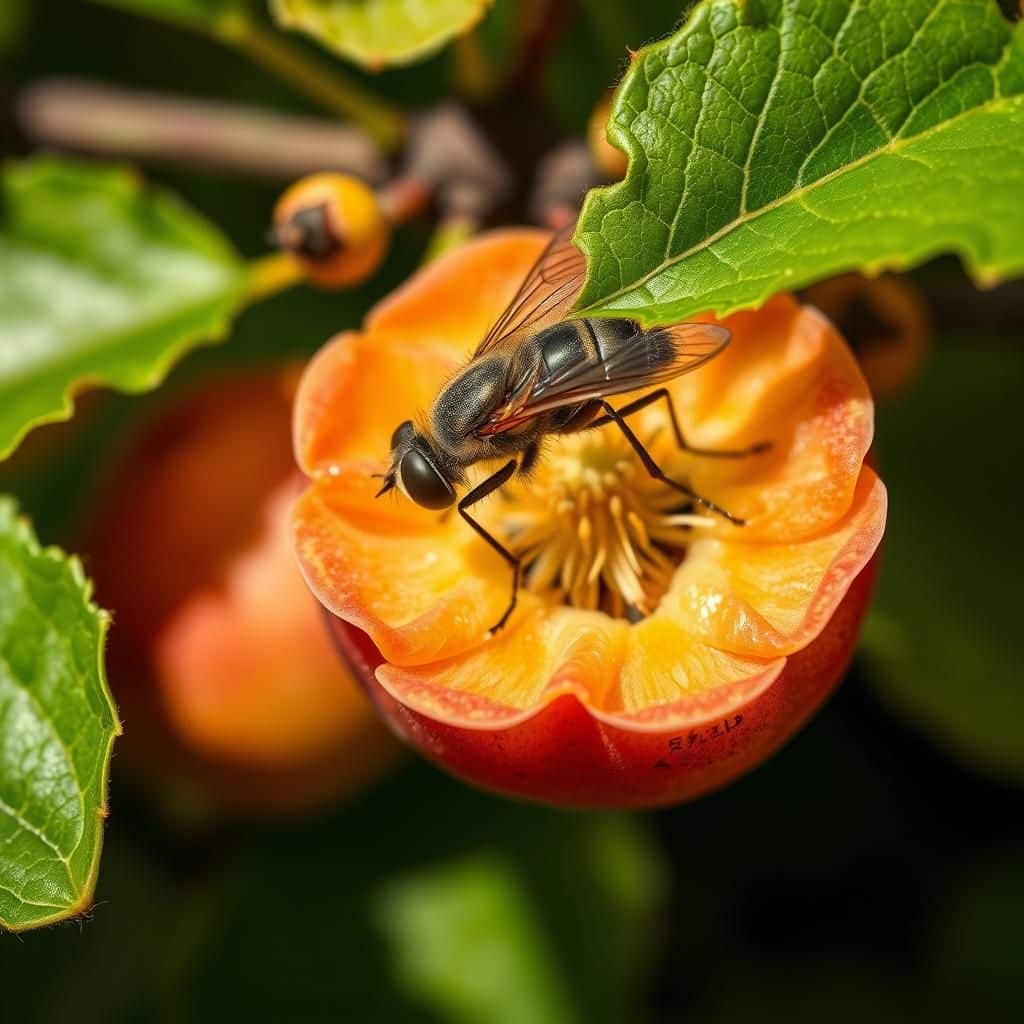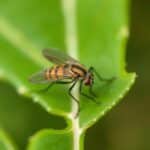The Ultimate Guide to Choosing the Best Fruit Fly Spray for Fruit Trees

Fruit flies can pose a significant threat to fruit trees, leading to reduced yields and compromised fruit quality. Choosing the right spray to combat these pests is essential for gardeners and farmers alike. This ultimate guide will walk you through the critical factors to consider when selecting the best fruit fly spray, including ingredients, effectiveness, and safety. We’ll also discuss timing and application methods to maximize your spray's impact while protecting beneficial insects. Whether you're tending to a backyard orchard or managing larger commercial fruit production, this comprehensive resource will empower you to make informed decisions for the health of your trees.
Effective Fruit Fly Spray for Protecting Your Fruit Trees
Fruit flies can pose a significant threat to the health and productivity of your fruit trees, making the use of an effective fruit fly spray essential for safeguarding your harvest. These pests are notorious for laying eggs on ripening fruits, resulting in damaged crops and reduced yields. Utilizing a targeted insecticide that is specifically formulated to combat fruit flies can minimize their impact while ensuring the spray is safe for the environment and beneficial insects. Timing is critical when applying the spray, as it should coincide with the fruit fly's life cycle to achieve optimal results, making regular monitoring and timely applications a part of successful fruit tree management.
Understanding Fruit Fly Behavior
Fruit flies are attracted to ripe and fermenting fruits due to the scent they emit, which signals a suitable breeding ground. Their life cycle consists of eggs, larvae, pupae, and adults, and they can reproduce rapidly under favorable conditions, leading to significant infestations in a short span. Understanding this behavior helps in determining the best times for spray application, as targeting them during their active breeding periods can significantly reduce their population before they cause extensive damage to your fruit trees.
Choosing the Right Spray
Selecting the right fruit fly spray involves considering both chemical and organic options that are effective against these pests. Chemical sprays often contain active ingredients that can disrupt the reproductive cycle of fruit flies, while organic alternatives may utilize natural compounds such as insecticidal soap or diatomaceous earth. It's crucial to read labels carefully to ensure the chosen spray is approved for use on edible crops and poses minimal risk to beneficial insects and pollinators, promoting an eco-friendly approach to pest management.
Application Techniques for Maximum Efficacy
To achieve maximum efficacy with your fruit fly spray, apply it during early morning or late evening when temperatures are cooler and winds are calm. This timing helps prevent the spray from evaporating too quickly and ensures better coverage on the foliage and fruit surfaces. Utilizing a sprayer that provides a fine mist can help coat the fruits evenly, and paying attention to areas where fruit flies are more likely to congregate, such as under the leaves and around the trunk, enhances the effectiveness of your pest control efforts.
Timing Your Applications
Timing your spray applications is critical for disrupting the fruit fly life cycle effectively. It is recommended to begin spraying when the fruit trees start to show signs of ripening fruit, as this is when fruit flies are most likely to target them for egg-laying. Regular monitoring of fruit trees for the presence of adult flies or larvae is essential, and sprays should be reapplied every few weeks or after heavy rain to maintain their protective barrier against infestations.
Integrating Other Pest Management Strategies
Integrating multiple pest management strategies can yield better results in controlling fruit flies. This can include setting traps to monitor and reduce adult populations, regularly harvesting ripe fruits to minimize breeding sites, and introducing natural predators like parasitic wasps that prey on fruit fly larvae. Creating a holistic approach that combines these strategies with your spray regime can lead to a more sustainable and effective method for protecting your fruit trees.
| Aspect | Details |
|---|---|
| Fruit Fly Life Cycle | Eggs, larvae, pupae, and adult stages |
| Application Frequency | Every few weeks or after rain |
| Optimal Timing | Early morning or late evening |
| Integration Strategies | Traps, harvesting, natural predators |
| Spray Types | Chemical vs. organic options |
What can I spray on my fruit to get rid of fruit flies?
:strip_icc()/BHG-DIY-Fruit-Fly-Spray-102771839-09fa89ce646d4f8e9bbb14f892bb107b.jpg)
To get rid of fruit flies on your fruit, you can use several types of sprays that are both effective and safe for your produce. Here are some solutions you can consider:
Natural Remedies
Natural remedies can be a gentle and effective way to deter fruit flies without using harsh chemicals. Here are some common natural sprays:
- Vinegar Spray: Mix equal parts of water and apple cider vinegar in a spray bottle. The acidity of vinegar can deter fruit flies.
- Essential Oils: Combine water with essential oils like peppermint or lemongrass, which are known to repel insects.
- Garlic Spray: Blend garlic cloves with water, strain the mixture, and spray it on fruits to keep flies away.
Commercial Insecticides
If natural remedies do not suffice, commercial insecticides designed for use on fruits can also be effective. When selecting a product, look for:
- Organic Insecticidal Soaps: These are safe for food crops and can kill insects upon contact.
- Pesticides labeled for edible fruits: Ensure they are safe for your specific type of fruit and follow application instructions carefully.
- Insect repellents formulated for fruits: Some products contain natural ingredients that are effective for repelling fruit flies.
Preventive Measures
Prevention plays a crucial role in managing fruit fly populations. By taking the following steps, you can minimize the likelihood of infestation:
See also:
- Store fruit appropriately: Keep fruits in the refrigerator or in covered containers.
- Clean thoroughly: Regularly clean countertops and dispose of overripe or rotten fruits.
- Use traps: Set up vinegar traps to capture fruit flies before they can infest your produce.
Homemade Fruit Fly Traps
Creating your own traps can be a cost-effective way to control fruit fly populations around your fruits. Common homemade traps include:
- Apple Cider Vinegar Trap: A bowl of apple cider vinegar covered with plastic wrap, with small holes poked in the top, lures and traps flies.
- Wine Trap: Leftover wine in a bowl can attract fruit flies; they get trapped and cannot escape.
- Soap and Water Trap: A mixture of water, sugar, and a few drops of dish soap can attract and trap fruit flies effectively.
Usage Guidelines for Sprays
When using any spray, it’s essential to follow certain guidelines to ensure safety and effectiveness:
- Read labels: Always check product labels for safe usage instructions particularly for edible produce.
- Apply evenly: Ensure an even application on all surfaces of the fruit for maximum effect.
- Wash fruits after treatment: Rinse off any sprays before consuming the fruit to avoid ingesting any chemicals.
What is the best bug spray for fruit trees?

When it comes to protecting your fruit trees from pests, selecting the right bug spray is crucial. The best bug spray for fruit trees effectively targets common insects while being safe for the plant and the environment. Here are some options to consider:
1. Neem Oil: This natural pesticide is derived from the seeds of the neem tree. It disrupts insect reproduction, repels pests, and has fungicidal properties.
2. Insecticidal Soap: Made from natural fats, insecticidal soap is effective against soft-bodied insects such as aphids and whiteflies. It works by suffocating the pests.
3. Pyrethrin: A natural insecticide made from chrysanthemum flowers, pyrethrin is effective against a wide variety of insects and breaks down quickly, making it environmentally friendly.
4. Horticultural Oils: These oils are refined, lightweight oils that control pests by suffocating them. They are safe for edible plants when used correctly.
5. Spinosad: This is derived from soil bacteria and is effective against caterpillars, thrips, and leaf miners. It's safe for beneficial insects when applied carefully.
Understanding Pest Problems
Pest problems in fruit trees can vary greatly depending on the species and location. Apple trees, for instance, are prone to codling moths, while citrus trees often face challenges with scale insects. It's essential to identify which pests are affecting your trees to choose the most effective spray.
- Identify the type of pests.
- Consider the life cycle of the pests for optimal timing of treatment.
- Monitor your trees regularly for signs of infestation.
Organic vs. Chemical Bug Sprays
The debate between using organic versus chemical bug sprays is ongoing among gardeners. Organic options tend to be less harmful to beneficial insects and the environment, while chemical sprays may provide quicker results.
- Organic sprays like neem oil are safe for the environment.
- Chemical sprays can provide immediate results but might affect non-target species.
- Consider your gardening philosophy when choosing a spray.
Application Techniques
Proper application of bug sprays is essential for effectiveness. Timely application and appropriate methods can enhance the results significantly.
See also:
- Apply during early morning or late evening to avoid harming beneficial insects.
- Use a sprayer for even coverage on leaves and branches.
- Follow the manufacturer's instructions for dosage and frequency.
Post-Application Care
After applying the bug spray, it's crucial to give your fruit trees proper care to help them recover and thrive. Monitoring for any signs of distress or further infestation can be beneficial.
- Water the trees adequately post-application.
- Monitor for adverse reactions to the spray.
- Continue to check for new pest activity.
Seeking Professional Advice
If you're uncertain about which bug spray to use or how to apply it, seeking professional advice can be very helpful. Local agricultural extension offices can provide guidance tailored to your specific region’s needs.
- Contact local extension services for recommendations.
- Join gardening clubs for shared experiences.
- Consult with pest control experts if needed.
How to make homemade bug spray for fruit trees?

To make homemade bug spray for fruit trees, you can use natural ingredients that are safe for plants and effective in repelling or killing pests. Here is a simple recipe and a detailed guide on how to create, apply, and store your homemade bug spray.
Ingredients Needed
To create your own homemade bug spray for fruit trees, gather the following ingredients, which are known for their pest-repelling properties:
- Water: The base for your spray.
- Soap: Preferably liquid castile soap, which helps the solution adhere to the pests.
- Vegetable oil: This helps to suffocate insects.
- Garlic: Known for its strong odor that deters many pests.
- Essential oils: Such as peppermint or neem oil, which have insect repellent properties.
Steps to Prepare the Bug Spray
Making the bug spray requires a few simple steps. Follow the instructions carefully to ensure the correct mixture:
- Combine ingredients: Mix 1 tablespoon of liquid soap, 1 tablespoon of vegetable oil, and 1 cup of water in a spray bottle.
- Add garlic: Blend a few cloves of garlic with a pint of water and strain the mixture. Add this to your soap and oil mixture for added potency.
- Add essential oils: If using, add 5-10 drops of insect-repelling essential oils to the mixture. Shake well to combine all ingredients.
Application of the Bug Spray
Applying your homemade bug spray correctly is crucial for its effectiveness. Use the following tips to ensure optimal results:
- Timing: Apply the spray during the early morning or late afternoon to avoid direct sunlight and protect beneficial insects.
- Target pests: Focus on areas where you notice insect activity, such as under leaves and along stems.
- Reapply frequently: Repeat the application every 7-10 days, or after heavy rain, for maximum effectiveness.
Storage of Homemade Bug Spray
Proper storage of your homemade bug spray is important to maintain its effectiveness over time. Consider the following guidelines:
- Use a dark container: Store the spray in a dark glass or opaque bottle to protect it from light.
- Cool, dry place: Keep the spray in a cool, dry place away from direct sunlight.
- Shake before use: Always shake the bottle before applying since the ingredients may separate during storage.
Alternative Recipes for Pest Control
If you're looking for variations or alternatives to the basic recipe, consider trying these different natural ingredients and combinations:
- Cayenne pepper spray: Mixing water with cayenne pepper can deter pests due to its spiciness.
- Beer trap: A mixture of beer and water attracts pests like slugs and snails, effectively capturing them.
- Mineral oil: A mixture of mineral oil and water can help suffocate insects upon contact.
Questions from Our Readers
What is fruit fly spray for fruit trees?
Fruit fly spray for fruit trees is a pesticide specifically designed to target fruit flies that infest trees, preventing damage to the fruit. This type of spray usually contains insecticides that are effective in disrupting the life cycle of the flies, thus protecting your crops.
How often should I apply fruit fly spray?
The frequency of application for fruit fly spray depends on several factors, including the severity of the infestation and the specific product instructions. Generally, it's recommended to spray every 1-2 weeks during the peak season of fruit flies to ensure maximum effectiveness.
Is fruit fly spray safe for my fruit?
Yes, most fruit fly sprays are formulated to be safe for use on fruits when applied according to the manufacturer's guidelines. However, it's important to follow the waiting period specified on the label to ensure that any residues are reduced before consuming the fruit.
See also:
Can I use homemade solutions for fruit fly control?
While homemade solutions, such as vinegar traps or soap sprays, can be effective for low-level infestations, they may not provide the same level of control as commercially available fruit fly sprays. Using a targeted insecticide specifically designed for fruit trees is often more effective for serious infestations.

If you want to read more articles like The Ultimate Guide to Choosing the Best Fruit Fly Spray for Fruit Trees, we recommend you check out our Gardeners category.
Leave a Reply
Related Articles